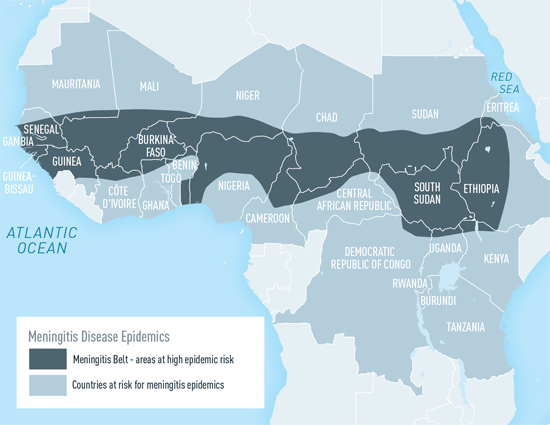Meningococcal Disease
What is meningococcal disease?
Meningococcal disease is caused by bacteria called Neisseria meningitidis. People with meningococcal disease spread the bacteria to others through close personal contact such as living together or kissing. A person with meningococcal disease needs immediate medical attention.
The symptoms of meningococcal disease can vary based on the type of illness. Common symptoms of meningococcal meningitis include sudden fever, headache, and stiff neck. Other symptoms may include nausea, vomiting, increased sensitivity to light, and confusion. Children and infants may show different signs and symptoms, such as inactivity, irritability, vomiting, or poor reflexes.
Bacteria that cause meningococcal disease can also infect the blood, causing septicemia. Symptoms of septicemia include tiredness, vomiting, chills, severe aches and pain, fast breathing, diarrhea, and a dark rash. Meningococcal disease can lead to death in as little as a few hours.

Who is at risk?
Anyone can get meningococcal disease, but people who live in or travel to certain areas of the world are more likely to get it.
The “meningitis belt” of sub-Saharan Africa has the highest rates of meningococcal disease in the world. The disease is more common in this part of Africa from December to June, during the dry season.
Travelers who spend a lot of time with local populations in the meningitis belt, especially during outbreaks of meningococcal disease, are more likely to get this disease.
Participants in the Hajj or Umrah pilgrimages in Saudi Arabia are also more likely to get sick.
What can travelers do to prevent meningococcal disease?
Getting a meningococcal vaccine is the best way to protect against meningococcal disease. There are two types of meningococcal vaccines available in the United States:
- Meningococcal ACWY (MenACWY) vaccine
- Serogroup B meningococcal (MenB) vaccine

Where are you going?
MenACWY vaccine is a routine vaccination given to pre-teens and teens in the United States. All 11 to 12-year-olds should get a dose of a MenACWY vaccine and a booster shot at age 16. Teens and young adults may also get a MenB vaccine, preferably at 16 to 18 years old.
Younger children and adults may also need a MenACWY vaccine depending on their travel plans. Some people who have been vaccinated before may need a booster shot. It takes 7 to 10 days after a person has been vaccinated before they have maximum protection against the disease. See your doctor as soon as possible before travel to make sure you are protected.
See if a MenACWY vaccine is recommended for your destination. There are currently no recommendations to receive MenB vaccine before traveling.
Those traveling to Saudi Arabia to participate in the Hajj or Umrah pilgrimages must show proof of MenACWY vaccination. It may also be referred to as tetravalent or quadrivalent meningococcal vaccine.
After Travel

If you traveled and feel sick, particularly if you have a fever, talk to a healthcare provider and tell them about your travel.
If you need medical care abroad, see Getting Health Care During Travel.
More Information
- Meningococcal Disease
- Meningococcal Vaccination
- CDC Yellow Book: Meningococcal Disease